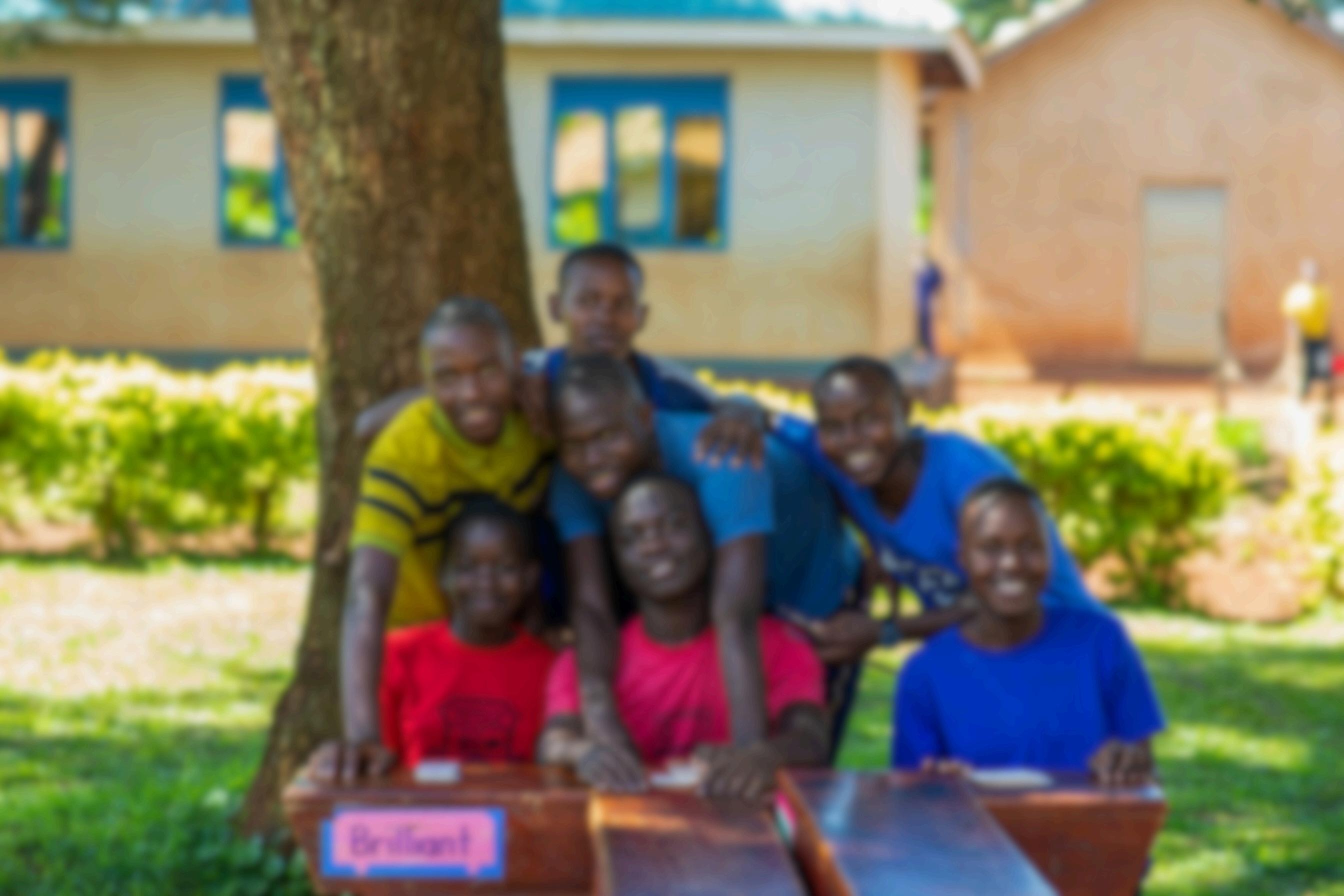
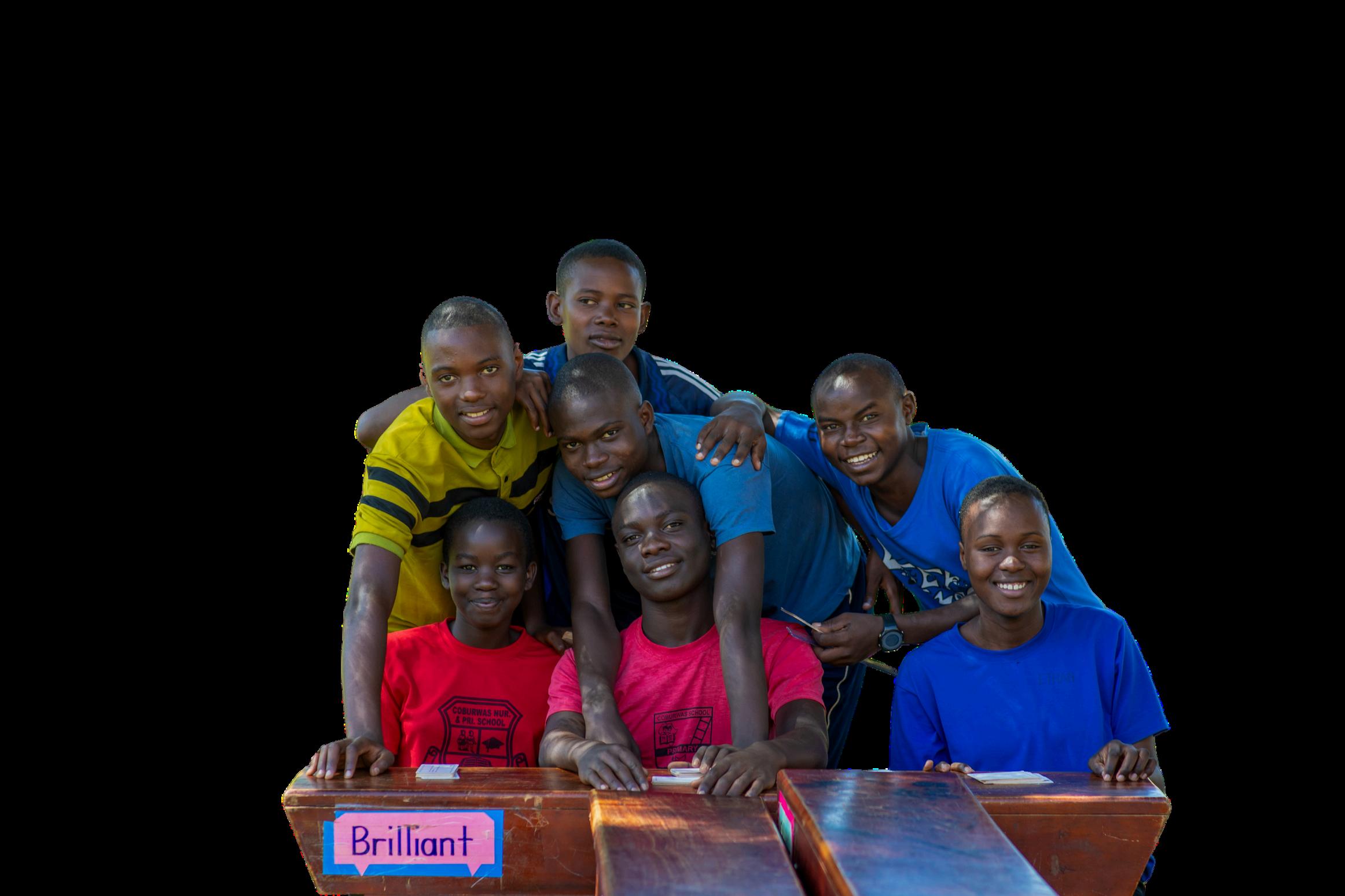



BEHINDTHESCENES PARTNERHIGHLIGHTS WHAT’SNEXTFORUS?
3 12 4 15 6 20
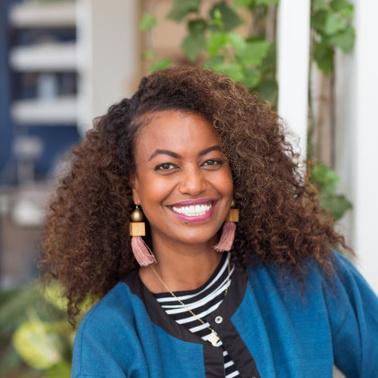
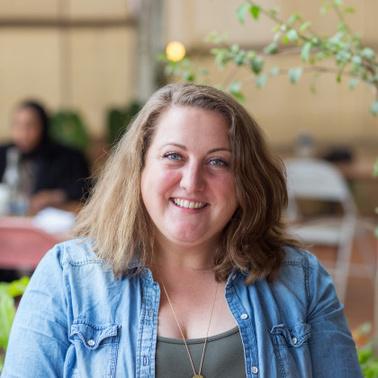
Dear Friends of the Collaborative,
The past few months have brought big moments for both our partners and African Collaborative, beginning in January with the announcement of impending global aid cuts The impact of these cuts continues to unfold and compound for local organizations like our partners, even now as we write
Despite ongoing uncertainty and challenges, one truth remains: proximate leaders are continuing to make extraordinary impact. In 2024 alone, our partners reached 8.7 million people, raised over $32 million, and led with innovation, heart, and purpose. From launching AI-powered tools for farmers in Malawi to shaping national education policy in Liberia, their efforts remain bold, creative, and deeply rooted in their communities.
This report captures the remarkable stories, milestones, and challenges faced by our 35 partners in the first six months of 2025. While funding cuts and aid freezes have created real hardship, with nearly half our partners losing direct funding, we’ve also seen an unwavering commitment to hope, resilience, and progress. We launched a $5M Response Fund to meet this moment and build long-term support for the organizations creating change from the ground up.
All these developments are happening at the same time we are stepping into a new chapter as African Collaborative, a name and brand change that reinforces our belief in the collective power of proximate leaders and the communities they serve
Thank you for walking with us We are thrilled to share this journey and report with you
With gratitude

Atti Worku Katie Bunten-Wamaru


35 51% 13 partners countries women-led in unrestricted funding committed since 2021
$8,400,000
Our partners are driving transformative impact across key sectors, including gender equity, livelihoods, education,
and
Together, we are driving impact for a future of Africa that is for and led by Africans.
Malawi
ACADES
Chimpembere Community Development Organization (CCDO)
Njira Impact
Rays of Hope
Wandikweza
Tanzania
Msichana Initiative
Shule Direct
The Community Forest Conservation Network of Tanzania (MJUMITA)
WoteSawa Domestic Workers Organization
Nigeria
Blossom Academy
Dr Ameyo Stella Adadevoh (DRASA)
Health Trust
Gender Mobile Initiative
HelpMum
WAVE
Women’s Health and Equal Rights Initiative (WHER)
Uganda
Barefoot Law
Bless a Child Foundation
CIYOTA
Fundi Bots
Uganda National Academy of Sciences (UNAS)
Wezesha Impact
Burundi
Foi en Action
SaCoDé
Democratic Republic of Congo
CIYOTA
Ethiopia
Drop of Water
Kidame Mart
Ghana
Blossom Academy
Regional Advisory Information and Network Systems (RAINS)
Kenya
AkiraChix
Clean Start Solutions
Dandelion Africa
Emergency Medicine Kenya Foundation (EMKF) This Ability
Liberia
Kids Educational Engagement Project (KEEP)
Rwanda
Blossom Academy Uwezo Youth Empowerment
Zambia
Primrose Community Health Organization (PRICHO)
Zimbabwe
Friendship Bench
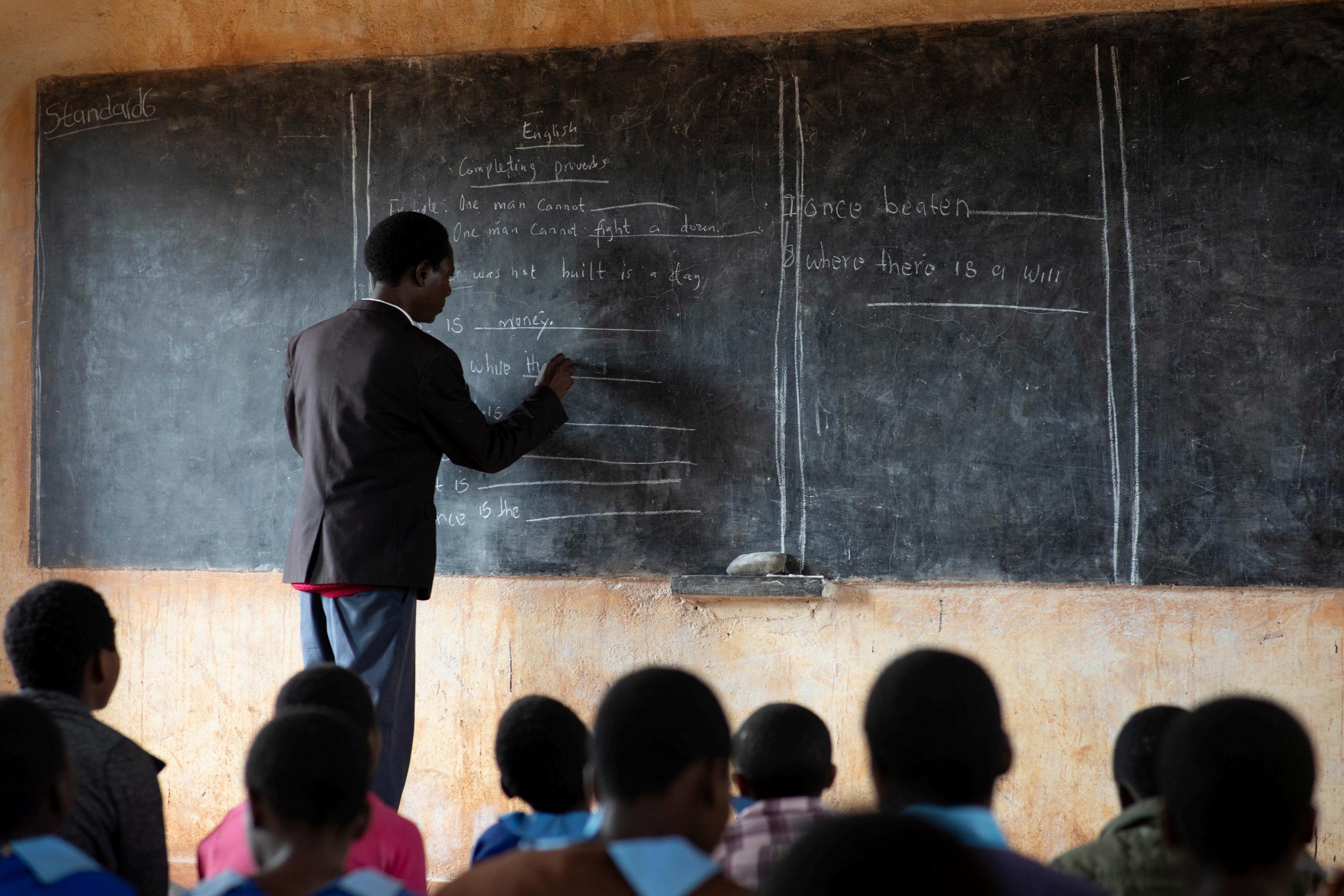
At the end of each year our Portfolio Services team shares an Annual Reflection Survey with our partners The survey is a critical touchpoint that allows us to build a deeper understanding of partners’ programmatic & strategic updates, goals for the future, accomplishments, challenges, and feedback for our team. These reflections were shared and analyzed earlier this year by Alfred Muli (Manager, Impact & Learning). Here are two standout highlights from partners’ 2024 data:

Partners served
8.7M+people
across communities in 13 African countries in 2024, a 91% increase from 2023.
Partners raised
$32,451,478 in 2024, a 14% increase from 2023. 49.62% of funds raised were unrestricted, and 48.35% was multi-year support.
The first half of 2025 has been marked by powerful milestones and well-deserved recognition for our partners. These moments of visibility showcase local leaders’ efforts and impact in transforming the lives of the communities they serve.
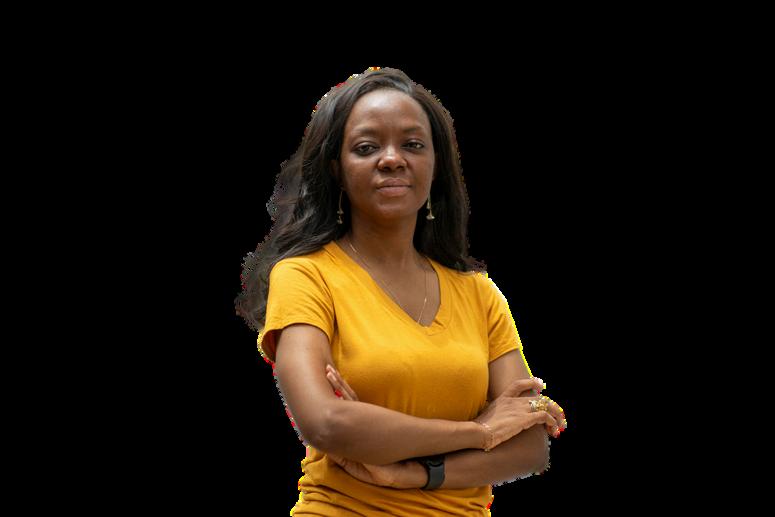
Omowumi Ogunrotimi, Founder and Executive Director of Gender Mobile Initiative, won the Global Citizen Prize Award, an award celebrating remarkable changemakers who are taking exceptional actions to end extreme poverty.
Dixon Chibanda, the Founder and Global Lead of Friendship Bench, published a book “The Friendship Bench: How Fourteen Grandmothers Inspired a Mental Health Revolution.”

BarefootLaw was featured in a Devex article about 19 local organizations to watch in 2025
BlossomAcademy expandeditsprogramto Rwanda markingitsthird countryofoperation
NjiraImpact(formerly knownasFOCCAD) unveiledabrandnew name,logo,andwebsite.
Drop of Water successfully secured their 501(c)(3) status.
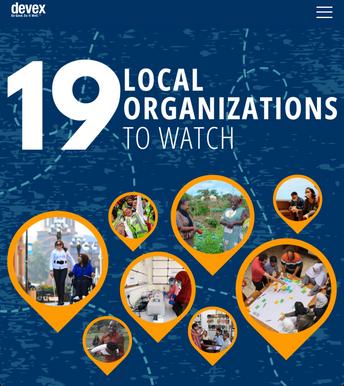
At the same time, our partners are boldly pushing forward with innovative approaches that are not only transforming their work but also reshaping the sectors they operate in.
At the start of the year, Faith in Action had planned to introduce mushroom farming to women’s groups as a strategy to combat malnutrition However, when faced with an unexpected supply shortage, they quickly pivoted brainstorming alternative solutions and successfully shifting to soybean production as a locally accessible protein supplement.
ACADESlaunched Malawi’sfirstAIFarmer App,Murimi,boosting agriculturalproductivity andenhancingclimate resilienceamongfarmers.

EmergencyMedicineFoundationKenya(EMFK)’s CasualtyAppisafree,offline-firstmobile tobridgethegapbetween ely,appropriatecare.It s,firstresponders,and orkerswithbasicemergency careinstructions.
IncollaborationwiththeMinistryofEducation, KEEPLiberiahasbeentaskedwithrevisingand finalizingthreekeyeducationpolicies.This initiativeisexpectedtoimprovethequalityand consistencyofeducationinLiberia,supporting thedevelopmentandsuccessofstudentsand schoolleadersalike.
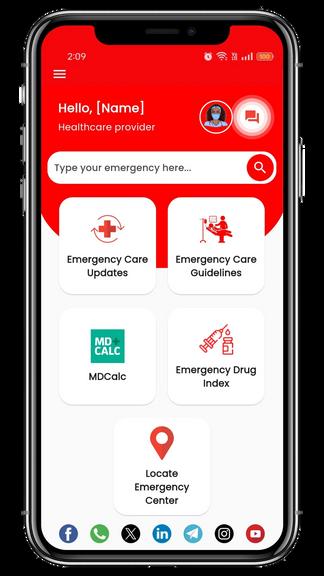
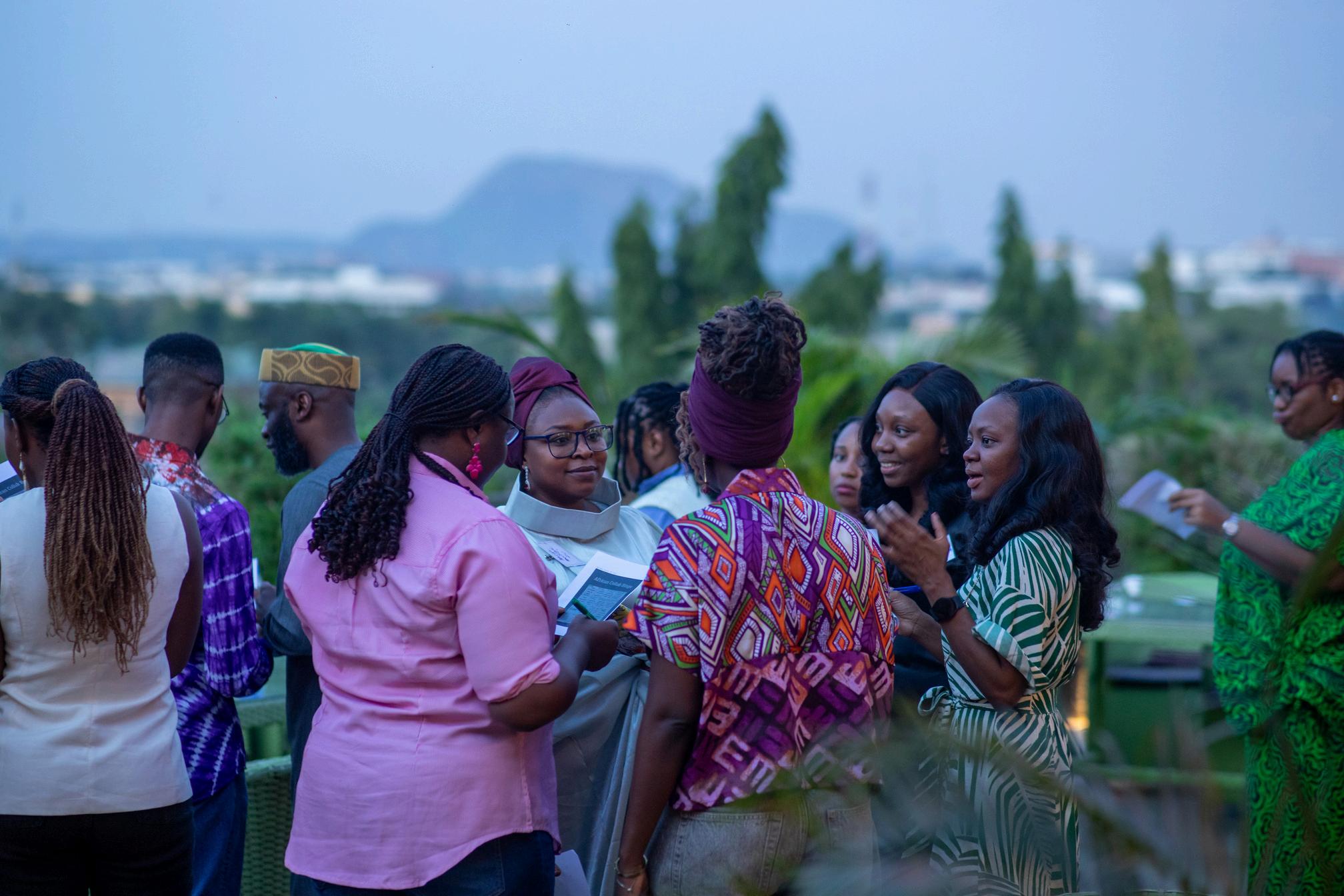
Building meaningful relationships with our partners is at the core of our work. During the first half of the year, we created intentional spaces for connection and shared learning. Whether through global gatherings, virtual exchanges, site visits, or rooftop dinners, we prioritized listening, learning, and showing up in ways that reflect both our values and those of our partners.
Our team provided support to partners attending Skoll World Forum by holding a learning exchange and prep session ahead of the conference, introducing them to aligned funders, and providing on-the-ground support while in Oxford We also held a debrief session following Skoll, providing a space for partners to share with us their reflections from the week
In-Country Partner Gatherings in Kenya and Nigeria
May 9th - In Kenya, our Portfolio Services team spent an evening with Dandelion Africa, Clean Start Africa, This Ability Trust, and Emergency Medicine Kenya Foundation. It was a night of rich conversation, shared insights, and joyful connection.
June 19th - To close out our Nigeria site visits, we gathered with WHER, Blossom Academy, DRASA Health Trust, Gender Mobile Initiative, and HelpMum in Abuja, Nigeria for an unforgettable rooftop evening at The Vue. There was laughter, games, and plenty of love in the air. Everyone left with full hearts. Explore the full galleries on our blog here.
Throughout May and June, our Programs team visited seven of our partners across Malawi, Kenya, Uganda, and Nigeria They visited Chipembere Community Development Organization (CCDO), Clean Start Africa, Emergency Medicine Foundation Kenya (EMFK), UNAS, CIYOTA, HelpMum, and Gender Mobile Initiative from cohorts 3 and 4 A clear theme emerged across these visits: despite operating in a time of sector-wide uncertainty, marked by significant funding cuts and rising pressures, our partners continue to show up with joy, energy, and a sense of momentum These organizations have weathered crises before, and their determination to keep serving and building is a powerful reminder of the resilience driving community-rooted leadership.
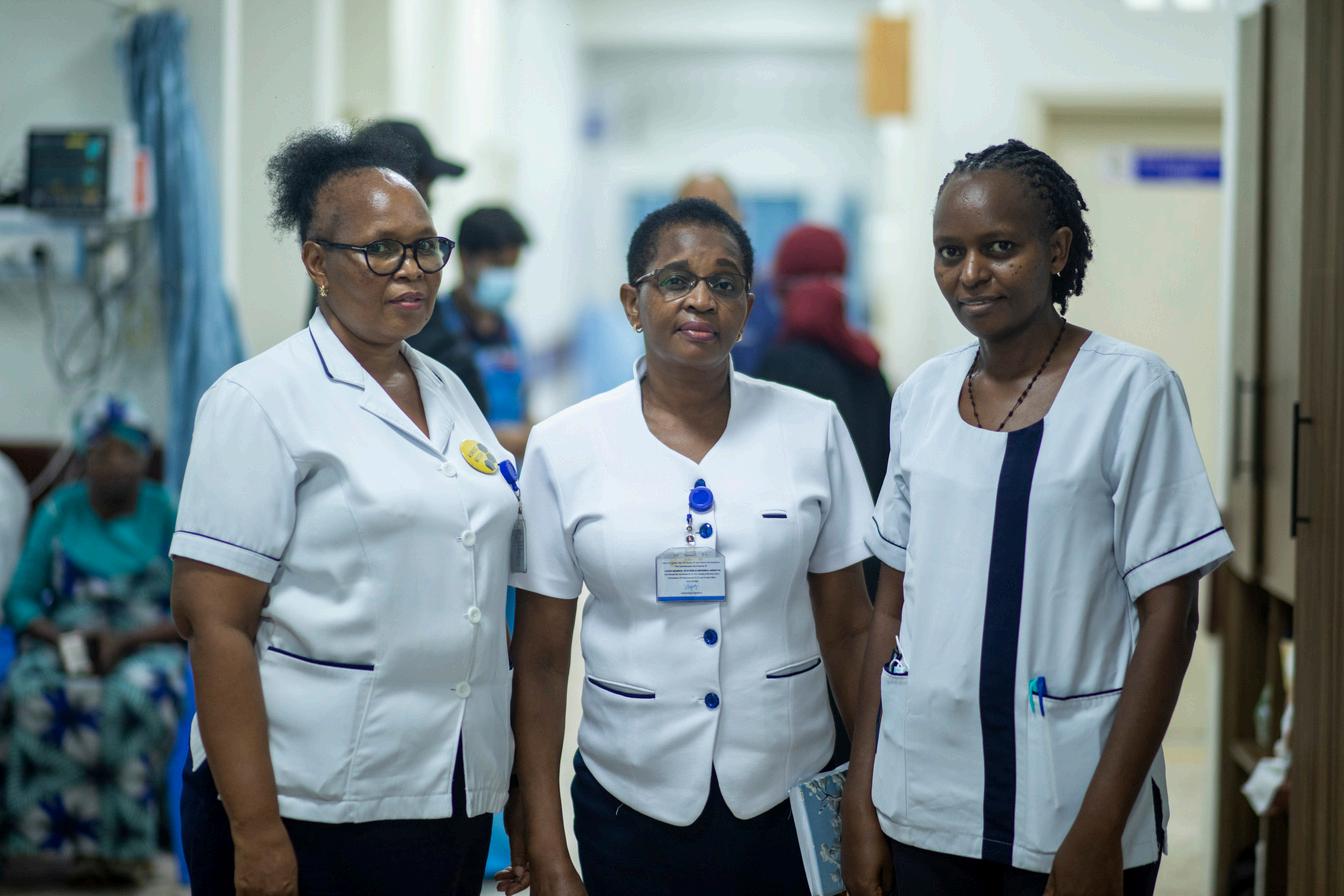
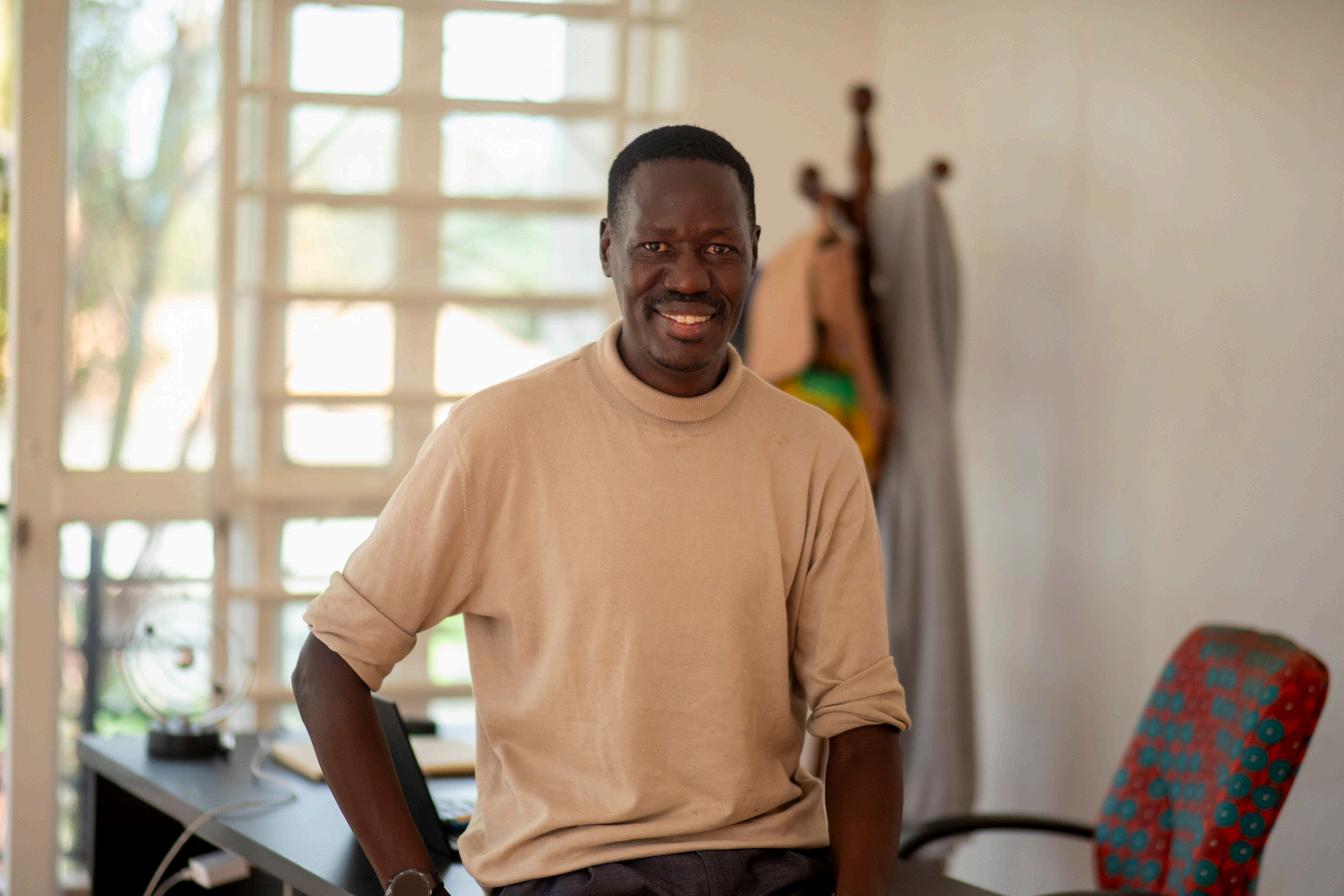
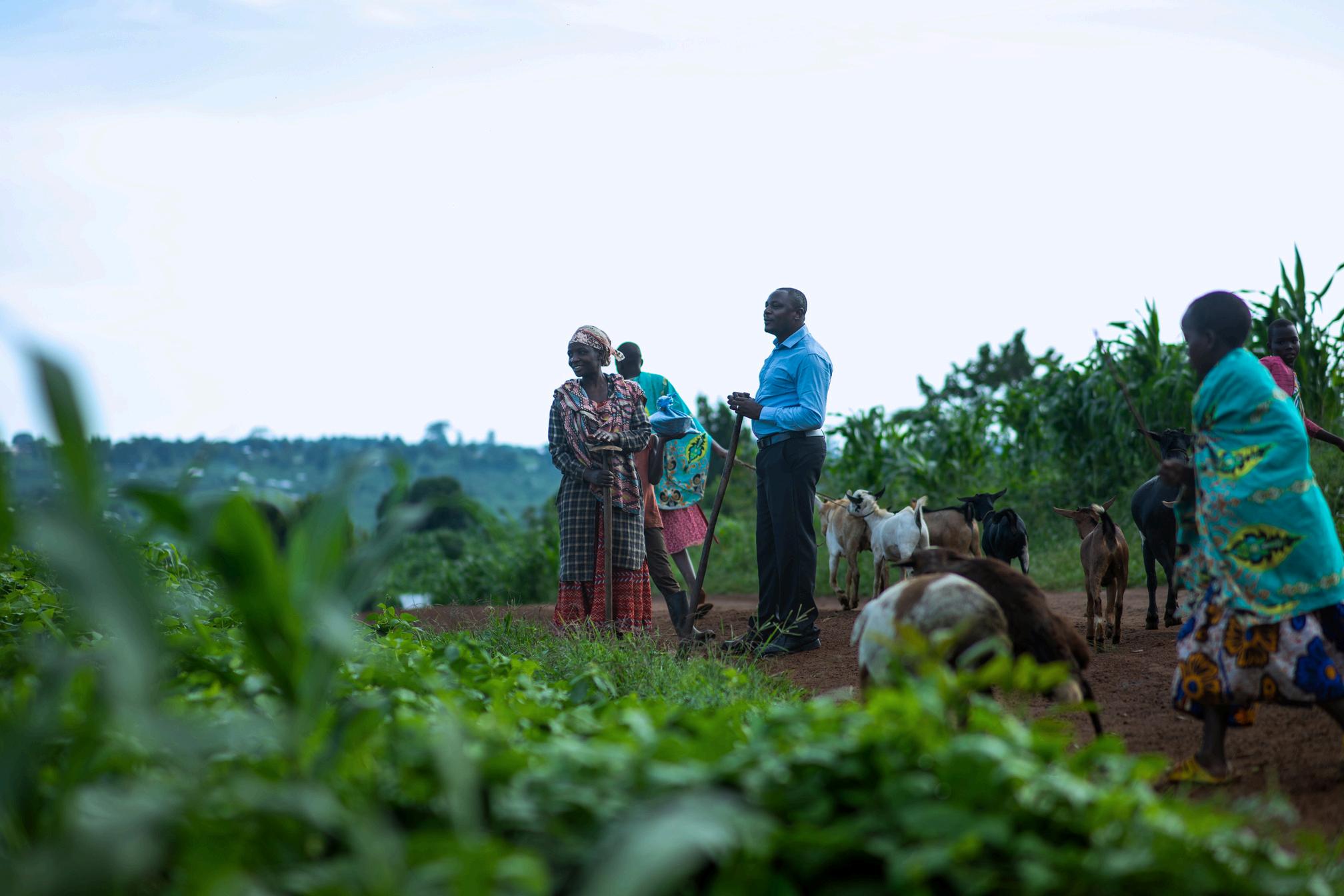
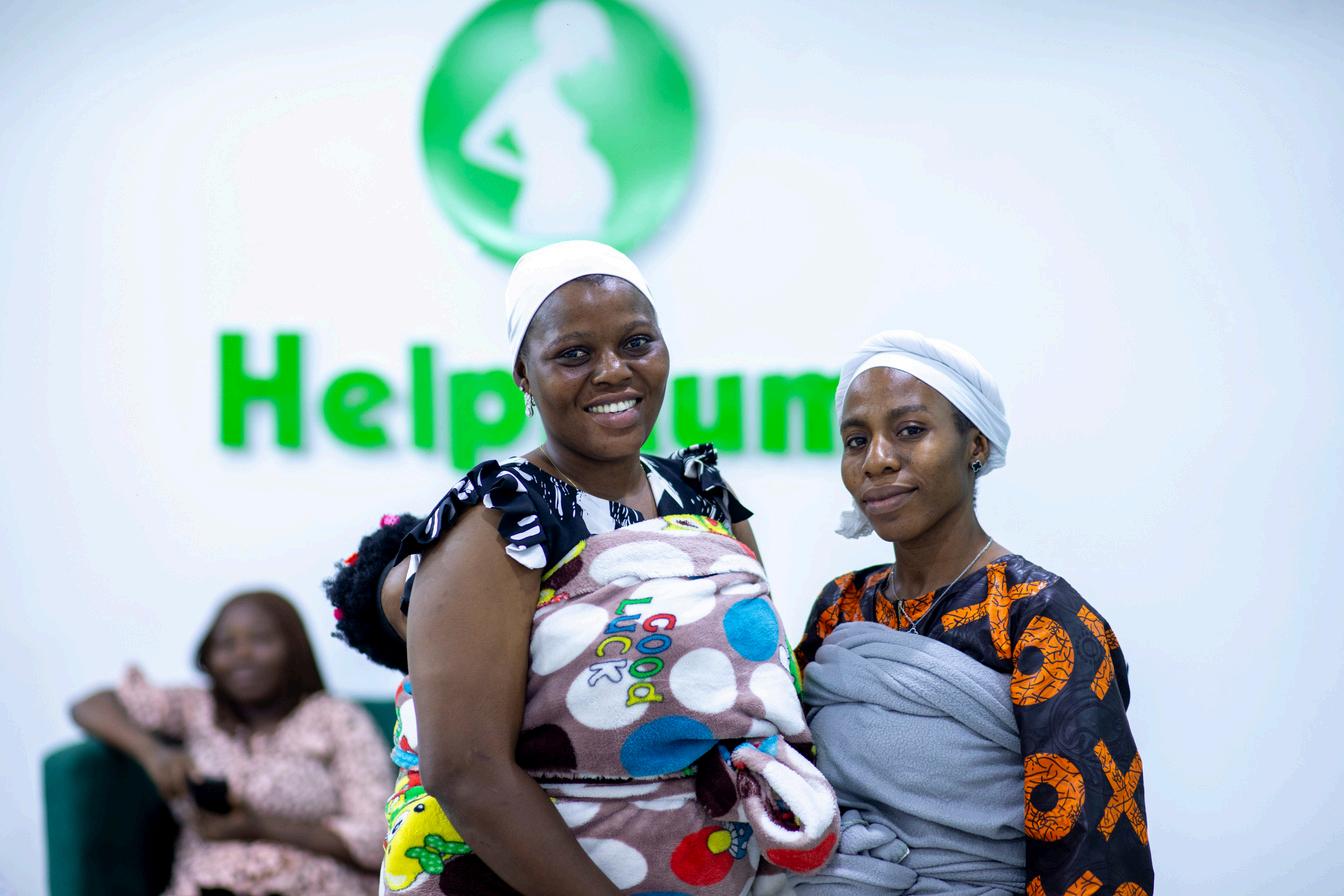
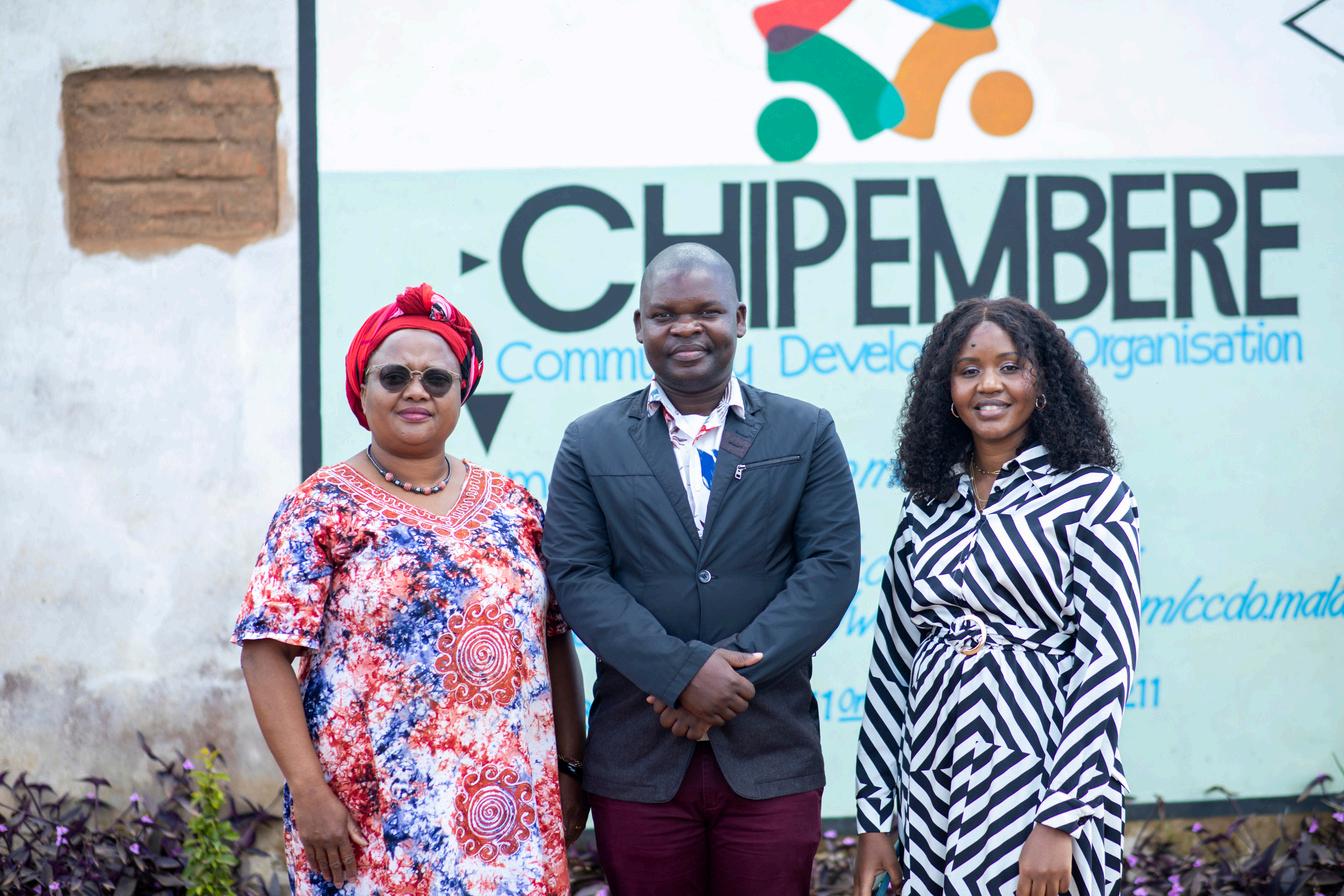
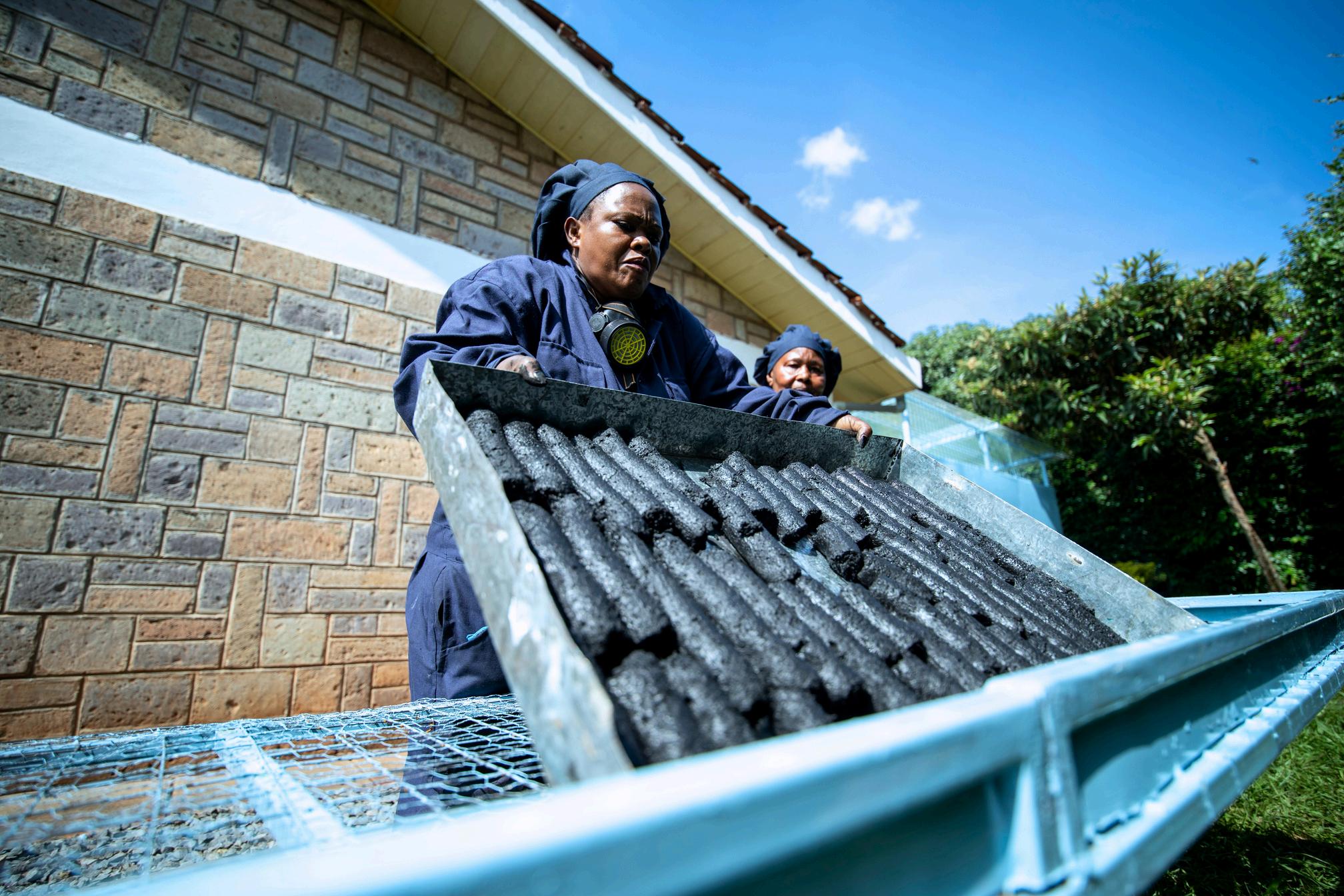
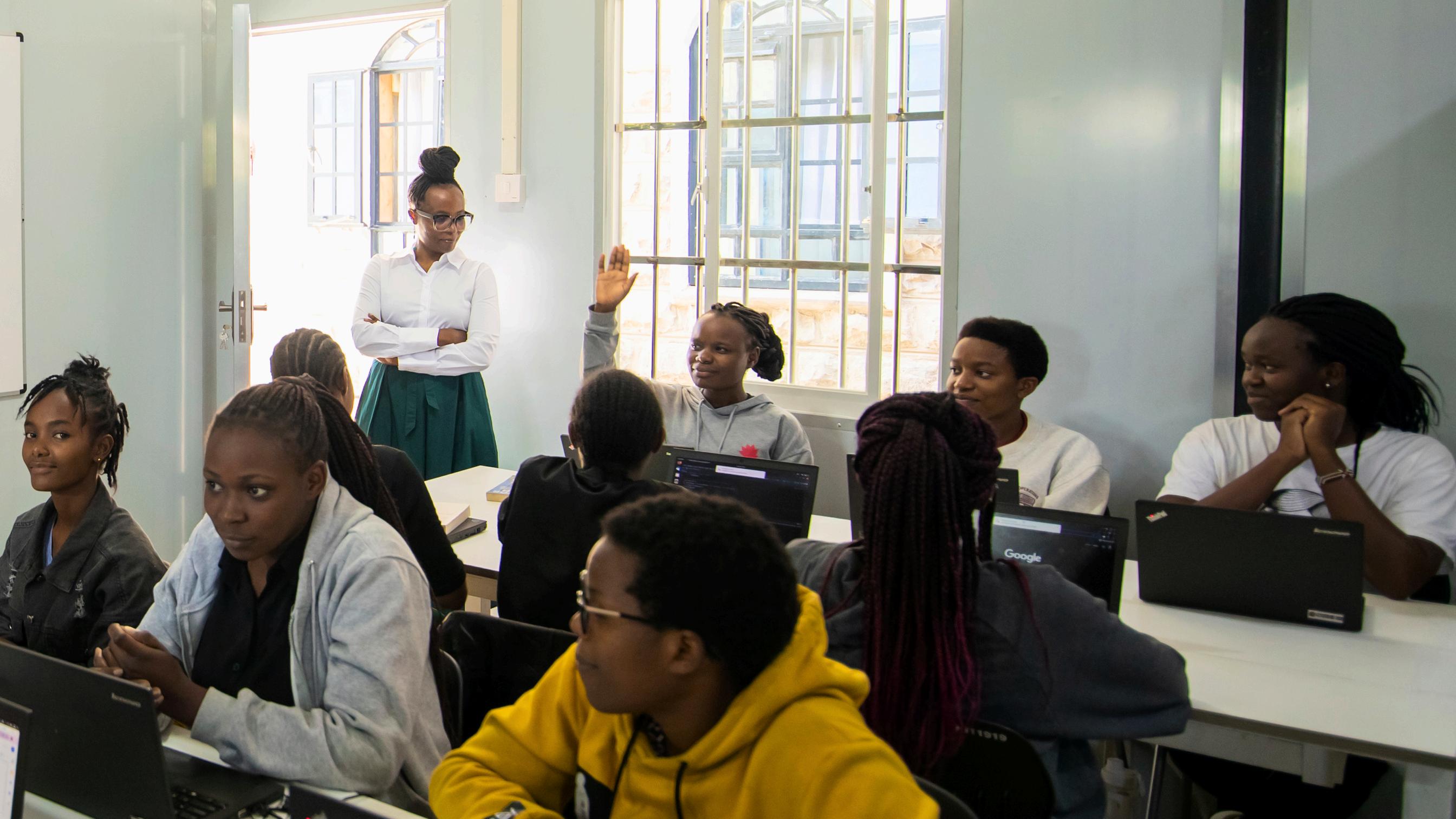
Linda Kamau Founder & Executive Director, AkiraChix
In January, the global development world was suddenly notified of impending funding freezes which ultimately escalated into cuts in affiliated projects and staff. Nearly all our partners were impacted by the sudden disruption, with 44% facing direct funding cuts. So far, partners have reported over $4 million in confirmed funding either lost or frozen, with an additional ~$4 million in projected shortfalls.
We identified three common challenges faced by our partners across different sectors and countries as a result of the funding cuts: programmatic reductions, strategic pivots, and indirect pressures from increased demand for services. Highlighting these shared challenges is essential for crafting targeted support strategies that enable partners to navigate these difficulties while sustaining their work. It also provides a foundation for recommending ways partners can collaborate and support one another.
An immediate consequence of funding reductions has been the need for local organizations to downsize their workforce Staff cuts often lead to halted or delayed projects, diminished operational capacity, and increased workloads for remaining employees For example, one partner had to cancel a promising project designed to support rural women entrepreneurs after losing anticipated funding, while another was never compensated for the time and effort invested in developing a project.
Funding uncertainties have compelled partners to make difficult strategic decisions, including delays or scaling back of important program components. For instance, a partner had to postpone the deployment of its Monitoring & Evaluation system, an essential tool for tracking progress and ensuring accountability In another case, a partner had to absorb staff from a program whose funding was cut, stretching their resources For some organizations, partnerships with government and other critical stakeholders have been put on hold Overall, partners have had to reconsider
their priorities, often postponing innovations or shifting resources away from long-term goals to maintain core services, which may slow down overall impact and growth.
Even partners whose funding levels have remained stable are experiencing indirect pressures through increased demand for services This is particularly evident for health partners working with HIV patients and other vulnerable populations who are experiencing instances of ‘Response Burden’ or organizations having to stretch resources to meet increased demand for services. As some programs scale back or close due to funding cuts, patients and communities increasingly rely on remaining service providers, resulting in heightened client loads. This surge stretches already limited resources, including personnel, medical supplies, and infrastructure and may compromise the quality and accessibility of care. Consequently, these partners face the dual challenge of meeting growing needs without a comparative increase in funding–threatening the sustainability of their programs and the health outcomes they support
Challenges like staff reductions, strategic delays, and increased demand without additional resources, directly hinder local organizations’ ability to plan and implement projects effectively. Cancelled initiatives and uncompensated work lead to lost opportunities and financial strain, while delayed systems and rising service demands stretch already limited capacities. Together, these affect partners’ operational stability and their impact in the communities they serve. Moreover, even in the gap funding being provided, most goes to larger international organizations that have easier access to funders and the staff capacity to turn around applications quickly Once they receive emergency funding, they typically prioritize their own operations before previous commitments to subawardees often local organizations As a result, local organizations, with the strongest community ties and greatest agility, receive the least response funding
The repercussions of these funding cuts are reminiscent of the early days of COVID when international organizations and projects had to shut down. Then as now, local organizations were left to fill in programmatic and service delivery gaps after international actors were forced to pull back or altogether discontinue their work
While the funding cuts continue to pose challenges, we strongly believe that this moment is an incredible opportunity for the philanthropic and development sector. It is a chance to rewire our ecosystem and fund more efficiently and effectively, and get money to the organizations best positioned to drive change–local organizations. Recognizing that funders are responding in different ways, from those encouraged to invest boldly in this moment to those uncertain about their next steps, we’ve taken the opportunity to speak out on what’s happening on the ground. Through our advocacy, we’ve made the case that this crisis underscores the critical importance of funding proximate leadership
For African Collaborative, a key component of our adaptation is the creation of a $5 million Response Fund with 100% pass through to provide immediate, flexible support to partners on the frontlines This fund is not only a timely response to current funding pressures but is also a forward-looking mechanism that allows our partners to remain resilient during future crises that may jeopardize their financial & operational stability. It reflects our commitment to preparedness in the face of external shocks that could stretch or curtail partners' capital.
Launching an emergency fund like our Response Fund is a core component of our 2030 strategy And this moment reinforces what we have long known: emergency funds are not optional They are essential Crises like these highlight how, because of our proximity to partners on the ground, collaboratives are
uniquely positioned to respond quickly and effectively in times of emergency.
We are advocating for emergency funding to become a standard of practice across the sector, not as a reactive solution, but a proactive safeguard embedded into grants Our partners agree that this is a structural necessity
“Workwithus[partners]toanticipate risk…[this]meansthateveryfunding thatdonorsallocatetoorganizations shouldhaveacontingencywithinthe fundingoranemergencyallocationto thatorganization.”
Akudo Oguaghamba Executive Director, WHER
In today’s environment, whether it’s climate disasters, political shifts, or conflicts, emergencies are not a question of if, but when. We’re inviting other funders to consider:
Embedding emergency allocations in your funding models;
Co-designing contingency frameworks with grantees;
And recognizing early warning signals as legitimate funding triggers.
This is a pivotal moment A chance to redefine how emergency funding allocations can safeguards local organizations’ operations and the communities they serve Let’s not wait for a crisis Let’s build readiness into the very structure of our funding relationships
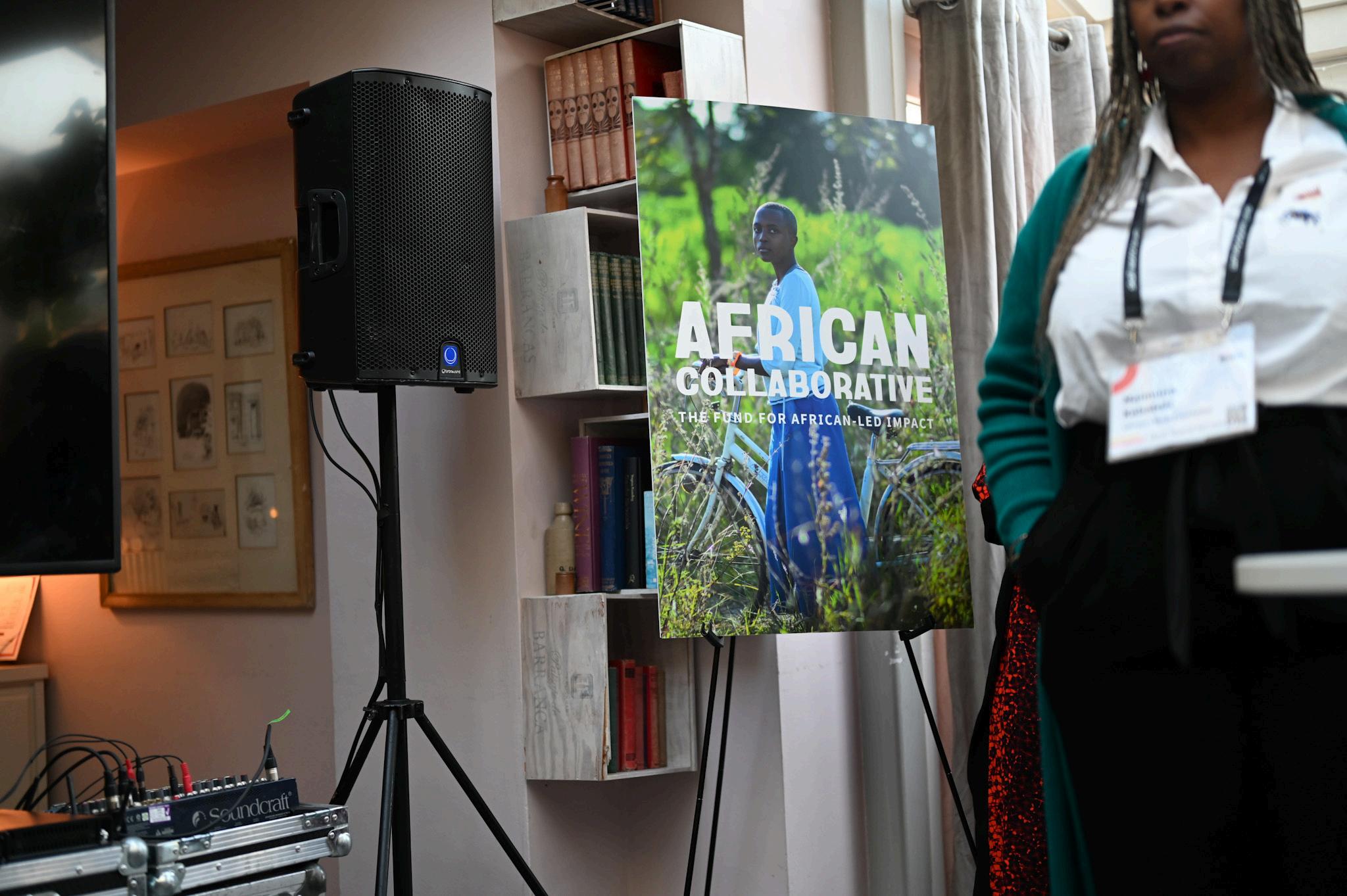
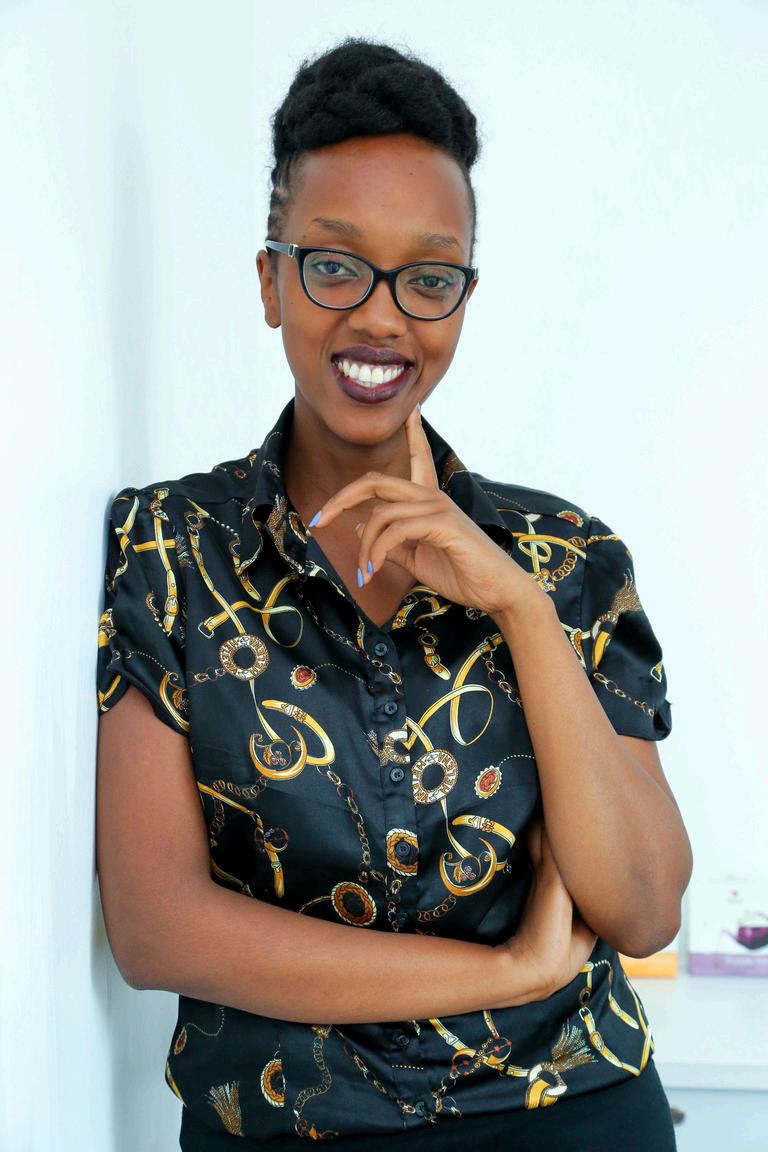

We’re excited to share that Carol Warui and Eddie Mandhry formally joined our Board of Directors on April 30, 2025. Both bring deep expertise and commitment to our mission. Carol is a seasoned strategic communications and public affairs expert, while Eddie brings expertise in building transformative ecosystems at the intersection of talent, technology, and purpose. Carol and Eddie have already begun contributing their insight and guidance behind the scenes. We’re confident their leadership will meaningfully strengthen our work in the years ahead In parallel, we’ve been working with The Boardroom Africa to identify and bring on additional mission-aligned board members.
In April, amidst the buzz of the Skoll World Forum, we hosted an unforgettable brand launch event at the beautiful Folly restaurant in Oxford, UK Friends and partners gathered for an intimate yet lively evening as we unveiled our new name and identity. This rebrand was the result of deep intention and care, shaped by the thoughtful input of our team and partners. While our name has changed, our mission and commitment remain steadfast. We’re excited for this next chapter in our bold journey. Explore our new website!
Alongside our brand reveal, we introduced new, streamlined sector portfolios. Our partners’ work is deeply multi-sectoral, and it is not meant to place their efforts into a single box. Instead, these portfolios help strengthen connections between funders and partners, and foster sector-specific learning opportunities. Named in indigenous African languages to honor local expertise, the portfolios foster strategic community-building, facilitate learning, and promote rich knowledge sharing across the ecosystem Learn more: https://www.africancollab.org/sector-portfolios.
March 13 - Happy Hour with African Collaborative & Supporters San Francisco, California
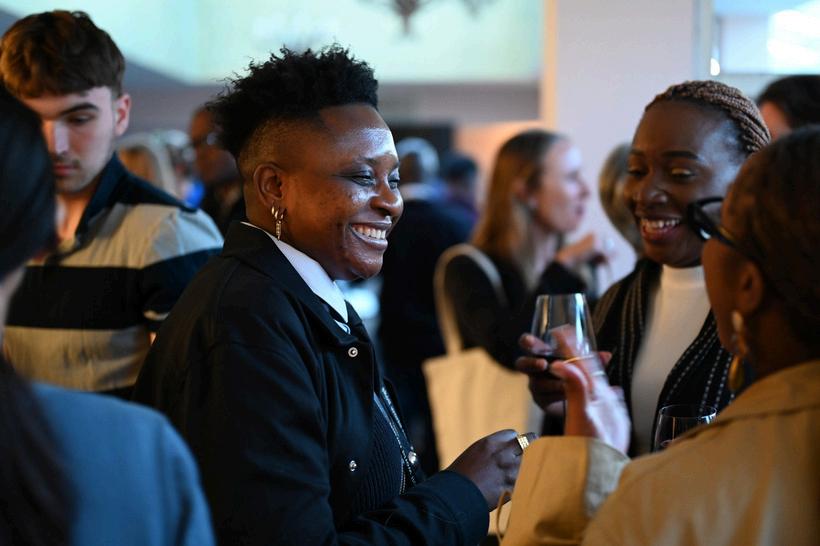
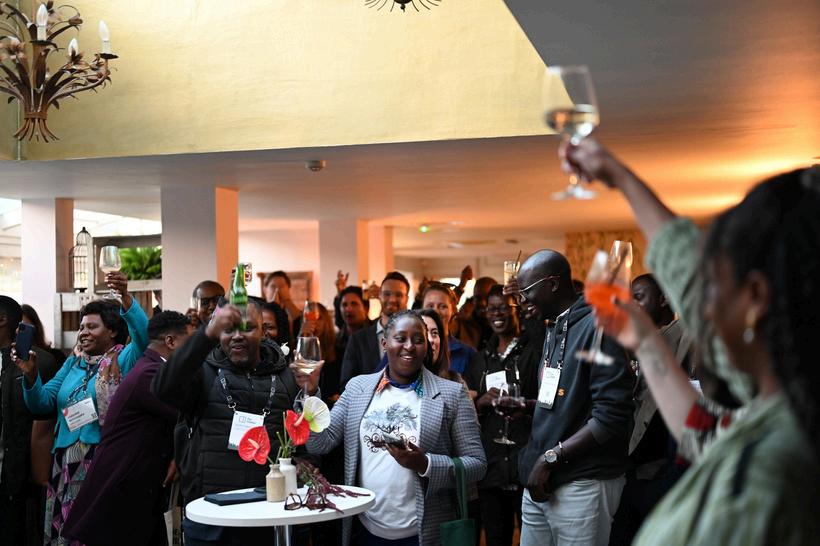
As part of our team’s San Francisco trip for the Global Philanthropy Forum and Collab Summit, we hosted a happy hour with our partners and funder friends.
March 31st - April 4th, SWF Community Happy Hours Oxford, UK
Skoll World Forum is a week our entire organization looks forward to each year, and this year was especially meaningful. We proudly launched our new brand and supported the highest number of our portfolio partners to attend, providing visa and accommodation support for partners. To kick off the week, we hosted a welcome happy hour at our favorite location, Turtle Bay Oxford, where we shared delicious Caribbean food with our team, partners, and board members. We closed out the week with a farewell gathering at Wig & Pen
We were proud to be featured in three major publications during the first half of this year, each highlighting a shared theme: the growing movement to transform global philanthropy by elevating local leadership.
New York Times - It’s Time to Reimagine Foreign Aid: Highlights our work as an example of the transformative impact of directly supporting local organizations.
Stanford Social Innovation Review - How Funder Collaboratives Are Supporting Proximate Organizations in Africa: Features a conversation between our Co-CEO, Atti Worku and Degan Ali (The Proximate Fund) on Africa’s collaborative funding movement and the importance of investing in community-rooted organizations.
Devex - At Skoll, Lessons on Resilience and how to Pivot During a Crisis: Atti Worku and Doug Galen (Rippleworks) reflect on how local organizations navigate crises, and what funders can learn about their resilience and adaptability.
Learn more about what our team and community are up to in our new series, Voices from the Collaborative.
March 12 - Global Summit of Collaborative Funds San Francisco, California
Co-CEO Atti Worku joined the “Collective Genius” session with leaders from the Proximate Fund and the Disability Rights Fund The panel, “Funding Proximally: Strengthening Local Leadership in a Changing Landscape,” expl collaboratives can support challenges of sustaining pro the opportunity to invest in solutions.
March 12-14 - Global Phila San Francisco, California
Co-CEO Katie Bunten-Wam year’s GPF Summit, themed Adaptive Philanthropy in an
April 4 - Stories of Local Le in the Face of Crisis, The S Oxford, UK
A continuation of our collab Rippleworks, this session h importance of coming toge to build long-term resilience during times of uncertainty. Our partners, Ntakamaze Nziyonvir (CIYOTA) and Mary Helda Akongo (Fundi Bots) joined as featured speakers.
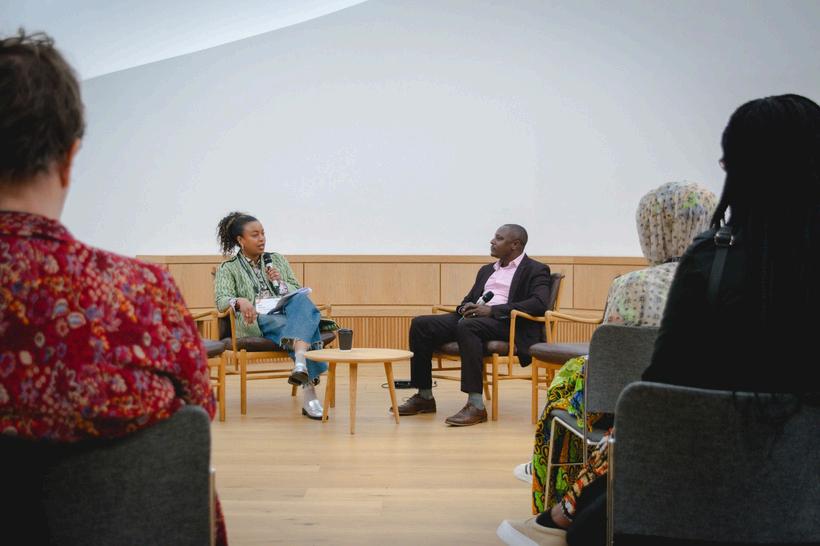
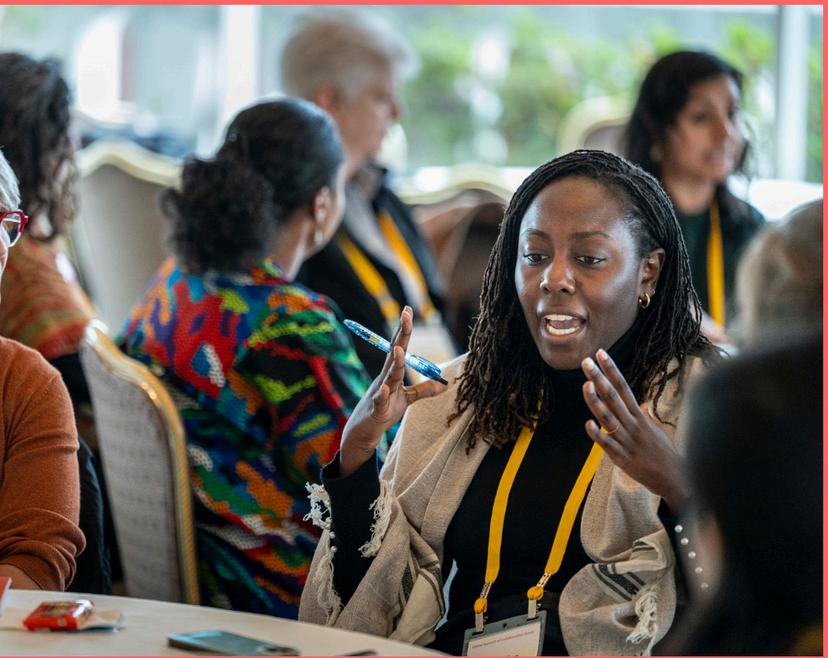
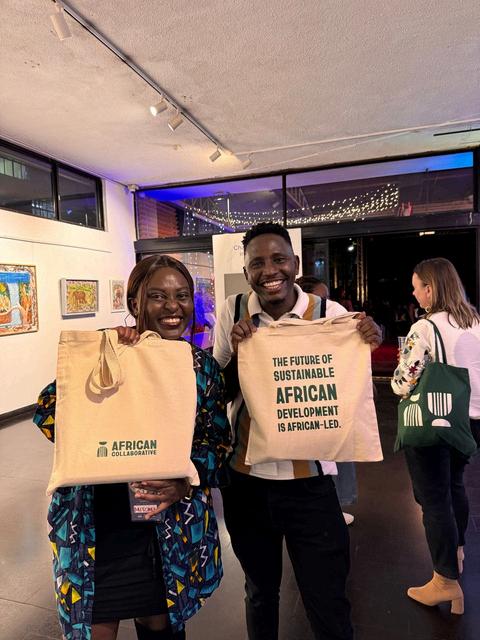
April 4 - Accelerating Systems-Change: Lesson from Nigeria, hosted by Gender Mobile Initiative and HelpMum
The session examined how funding models, pol interventions, and locally led initiatives can driv systemic change Co-CEO Katie Bunten-Wamaru participated, alongside an incredible group of panelists, who shared powerful insights and lessons from their journeys toward sustainable social impact.
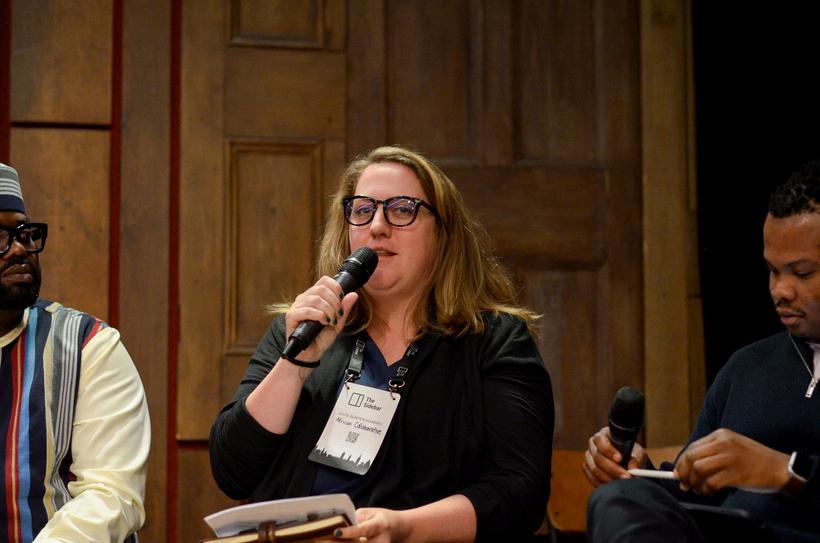
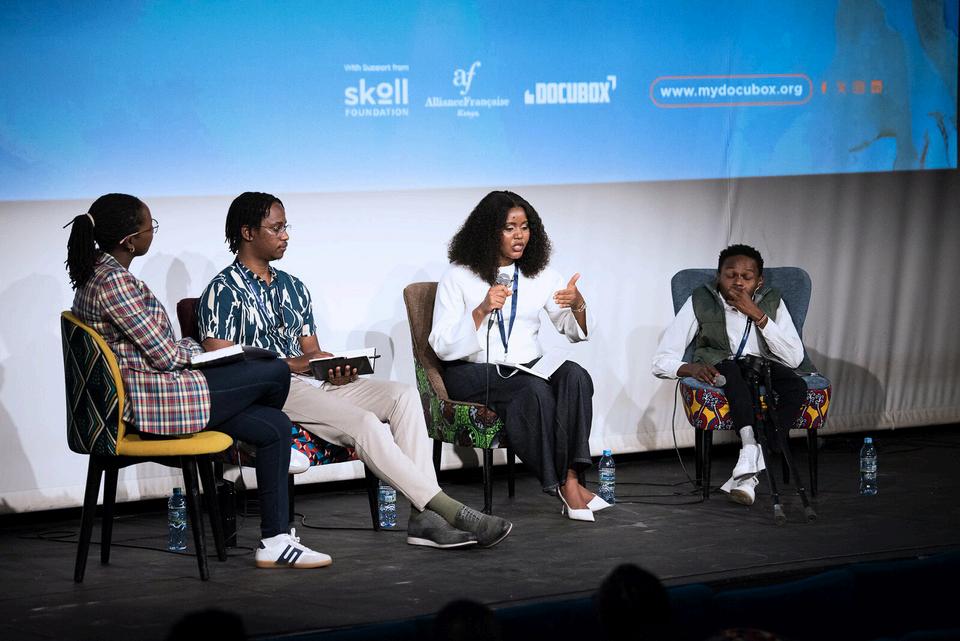
April 25 - Changemakers in Focus, A Skoll World Forum Regional Watch Party hosted by Docubox Nairobi, Kenya
Doris Kamathi (Manager, Portfolio Services) spoke on a powerful panel during an event that brought the spirit of the Skoll World Forum to Nairobi, centering Kenyan voices in global conversations about change. Doris highlighted one of African Collaborative’s guiding principles: shifting power and trust in philanthropy. Watch Doris’ panel session here.
May 19-21 - West Africa CivicTech Conference Lagos, Nigeria
Nafi Sene (Senior Manager, Portfolio Services) joined the panel titled “Rethinking AI and CivicTech for People, Impact, and Inclusive Governance.” The conference brought together civic tech innovators, policymakers, and changemakers from across the region to explore how technology can enhance transparency, accountability, and citizen engagement in governance. During the discussion, Nafi offered a powerful call for more flexible, trust-based funding. Watch the panel session here.

June 16-18 - Livelihood Impact Fund Gathering Nairobi, Kenya
Michelle Wanjala (Associate, Grantmaking Systems) joined a fireside chat at the Livelihood Impact Fund (LIF) Gathering, alongside Elevate Prize and Co-Impact, sharing insights into our grantmaking process and how it shows up in practice Michelle provided a behind-the-scenes look at how our grantmaking works.
June 25 - Africa Rising, Virtual Roundtable
Shamira Lukomwa (Senior Manager, Strategic Partnerships) participated in a panel, From Aid to Investment: Reshaping Capital Flows for Sustainable Development, hosted by the Ford Foundation, Clinton Global Initiative, and CorpsAfrica, exploring strategies to reshape capital flows in support of long-term, inclusive, and resilient development Against the backdrop of the recent aid cuts, she emphasized the need to rethink traditional aid models by challenging persistent myths about local leadership
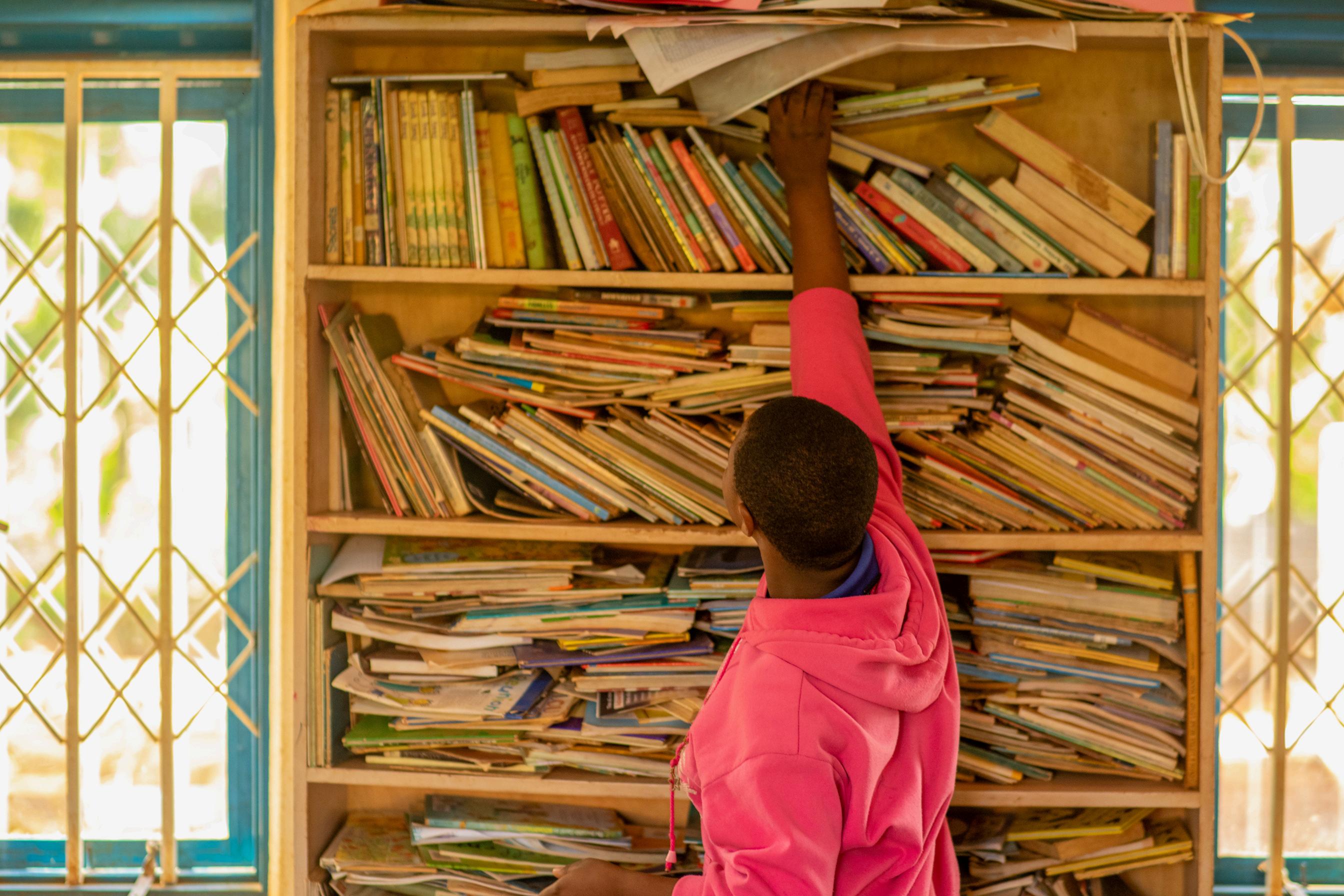

Starting our 5th grantmaking cycle using our newly launched Open Application System.
Our call for applications will remain open for four weeks: August 19th through September 17th.
If you know of African-led organizations creating sustainable, locally rooted change, please pass this opportunity along.
We are excited to welcome a new cohort of diverse, high-impact, African-led organizations into our dynamic portfolio.
You can catch us this fall at these gatherings! If you see our team, say hi—we’d love to connect!
Innovations in International Philanthropy Symposium, Boston: September 18-19 2025
UNGA & Climate Week, New York: September 22-26, 2025
Lukomwa Senior Manager, Strategic Partnerships
shamira@africancollab.org www.africancollab.org